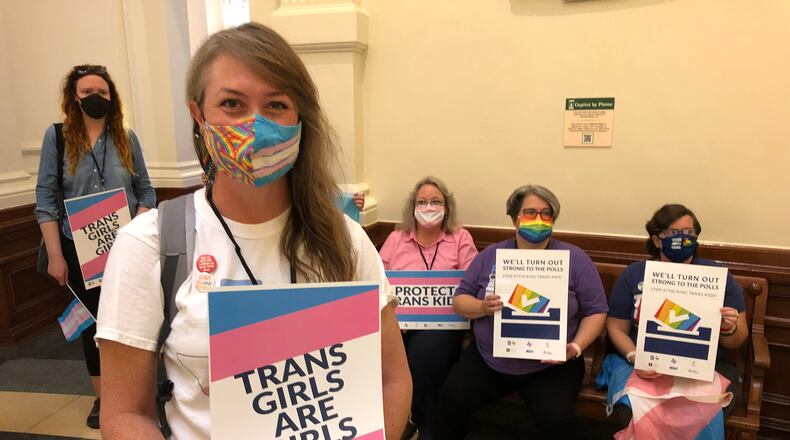Before a Senate committee advanced a bill barring transgender athletes from playing school sports in the gender they live every day, the Cobb mother of a transgender child asked a question that went unanswered: “This bill is called Save Girls Sports, but how do I save my daughter?”
Jen Slipakoff, whose middle-schooler is in her third year of lacrosse, asked: “How do I tell her I’m sorry you can’t play lacrosse anymore because some legislators down at the Capitol who have never met you, who have never seen you play, don’t think you should? How do I tell her that instead of spending time with her friends playing a game that she loves that she’ll be relegated to having to watch them on the sidelines?”
Lawmakers didn’t respond to Slipakoff because they prefer to see transgender girls as an abstract rather than as real children whose mental health they’re willing to endanger for a political end.
Under Senate Bill 435, student participation on a sports team would be decided by the biological gender listed on a child’s birth certificate, even if a student born male lives as a female. It would apply to public schools, as well as private schools that compete against public schools.
State Sen. Marty Harbin, R-Tyrone, insists his legislation champions fairness. “It is simply not fair to force biological girls to compete against biological boys.” At stake, he said, is “a chance for character-building athletic accomplishments and invaluable scholarship opportunities.”
What is also at stake is the mental health of transgender children, who already are more likely to attempt suicide. A recent Trevor Project survey found more than two-thirds of LGBTQ youths said the recent debates over state laws targeting transgender people — including transgender sports bans — damaged their mental health.
“Transgender kids and queer youth are killing themselves because of bills like this. I almost did,” said Bentley Hudgins, an LGBTQ rights organizer who identifies as nonbinary and has filed to run for Georgia House Seat 90. “Schools should be a place where all students feel safe and have every opportunity to realize their full potential. All of Georgia’s students deserve to take part in school activities without fear of being targeted.”
“This attempt to ban transgender kids from playing sports just because of who they are will put all of our kids in boxes based on their genders, races and backgrounds and leads to bullying of kids who don’t conform to stereotypes,” said Jeff Graham, executive director of Georgia Equality.
Texas imposed a transgender ban last month, the 10th such law in the country. Kentucky and Indiana advanced copycat bills last week. Most of the laws are spurring lawsuits, including in Idaho, which passed the nation’s first ban in 2020. In issuing an injunction against Idaho’s law, a U.S. district judge pointed out the policy “stands in stark contrast to the policies of elite athletic bodies that regulate sports both nationally and globally.”
Both the International Olympics Committee and the NCAA have inclusive policies around trans athletes. So, why would Georgia ban transgender athletes at the youth level where the goal is not a gold medal but, as Harbin said, character building and learning to be part of a team?
As state Sen. Elena Parent, D-Atlanta, pointed out during a recent hearing on the bill, it would not make sense that athletes can compete in the Olympics as a trans athlete but not at a Georgia high school.
There are no reports in Georgia of transgender girls dominating state championships or earning all the lucrative scholarships. But the bill, which failed to move last year, now appears to have the blessing of Gov. Brian Kemp. Kemp is vying with Republican challenger David Perdue for the most regressive education platform in an effort to polish his conservative credentials.
In an oblique reference to transgender students playing school sports, Kemp said, “With three daughters who all played sports in middle school and high school, Marty (his wife) and I want to protect the same, equal opportunities for success that our girls had for all of Georgia’s students.”
Georgia State University student Camden Hughes belongs to a premier women’s rugby team with two transgender teammates.
“None of my teammates feels uncomfortable playing with transgender teammates,” said Hughes. “Taking away the opportunities of these transgender teammates would be taking away members of our team, which is our family. This is not a bill to help athletes. And, for the record, transgender athletes have never been a threat to me. But maybe that’s just because I’m good at what I do.”
About the Author
The Latest
Featured



